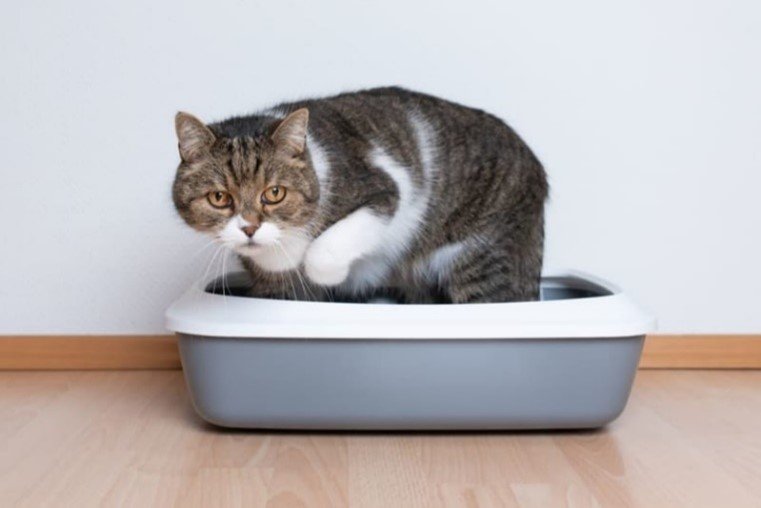Cats and dogs: Urinary conditions managed with nutrition
Authored by Hollie Furey
This article is going to cover how nutrition can help to prevent and treat urination problems in cats and dogs!
Cats:
Inappropriate urination is the most common cause for many cats to be rehomed! Cats often urinate inappropriately when they have Idiopathic Cystitis.
Feline Idiopathic Cystitis is the inflammation of the bladder with no identifiable cause. It usually affects younger cats between the ages of 1-10 years and is usually sterile (no bacterial cause). It is often triggered by stress. Stressful events for cats can include moving home, home renovations, conflicts with other cats, changes in routine, introduction of new pets or family members, loud noises etc..
Symptoms of idiopathic cystitis in cats are:
Frequent trips to the litter box
Straining when urinating
Blood in the urine
Licking genitalia excessively
Urinating outside the litter box
Lethargy or signs of pain
Remedies for idiopathic cystitis in cats are:
We often recommend the Hills c/d Multicare Stress Diet to prevent cats diagnosed with idiopathic cystitis from suffering with repeat episodes in the future and it can be used as a treatment for cats with idiopathic cystitis alongside an anti-inflammatory medication.
Hill's Prescription Diet c/d Multicare Stress is specifically designed for cats with stress-related urinary issues. It contains ingredients that help to manage stress which is a major contributing factor to feline idiopathic cystitis. The Hills C/D Urinary stress diet comes in both wet and dry forms. It contains milk protein hydrolysate which helps to decrease fearfulness in cats. It also contains L-Tryptophan which is an amino acid that is a precursor to serotonin, a neurotransmitter associated with mood regulation and a sense of well-being. In cats, L-tryptophan can help manage stress and anxiety by promoting the production of serotonin, which has calming effects.
Bladder Stones:
Bladder stones (known as uroliths) can form in the urinary tract and cause irritation. Stones vary in size; they can be smooth or have jagged edges. Stones cause problems because they can damage the surrounding tissue, cause inflammation, scar tissue and predispose your cat to infection.
Struvite and calcium oxalate are the most common types of uroliths in cats. Cats with urolithiasis show similar symptoms to Feline Idiopathic Cystitis and commonly show:
Signs of straining to pass urine
Blood in the urine
Repeated urination
Are unable to pass urine.
The Hill's Prescription Diet c/d Multicare Stress is designed to dissolve struvite stones and reduce the risk of stone recurrence. The diet can dissolve struvite stones in cats in as little as 7 days! but it typically takes around 27 days. This is particularly helpful because it avoids your cat needing a cystotomy surgery to physically remove the stones which is an invasive surgical procedure.
The Hill's Prescription Diet c/d Multicare Stress also helps to maintain a healthy urinary environment and promotes a balanced pH level to prevent crystal formation. It contains added antioxidants to promote overall health and omega-3 fatty acids for anti-inflammatory properties. Phosphorus and magnesium are controlled (these are substances which form the struvite stones).
Dogs:
Canine bladder stones:
When mineral crystals in a dog's urine combine to form uroliths (stones), they can become large enough to cause the following symptoms:
Blood in the urine (Haematuria)
Difficult urination (Dysuria)
Partial or full obstruction of the urinary tract
Though diet can be a contributing factor in stone formation, it can also be helped with treatment and prevention. Like cats as previously discussed, the most common uroliths in dogs are struvite (magnesium ammonium phosphate) and calcium oxalate.
In dogs, struvite bladder stones usually form as a complication of a bladder infection. Most canine struvite urolithiasis occurs in females due to their increased likelihood of bacterial urinary tract infections. Struvite stones can be seen on an x-ray. They are the only stones that can be completely dissolved via a therapeutic diet.
An x-ray showing a dog’s bladder that is filled with large struvite bladder stones present.
Remedies for Bladder Stones:
The Hills Canine Prescription Urinary Care Diet c/d contains S+OXSHIELD which has been made to dissolve struvite stones. Struvite stones form more easily in alkaline urine (higher pH), and they tend to dissolve in acidic urine (lower pH). Hills Canine Prescription Urinary Care Diet c/d works to acidify the urine, which creates a more acidic environment in the urinary tract that is unfavourable for the formation of struvite crystals and helps to dissolve existing struvite stones.
This diet can be used to prevent your dog having a cystotomy (surgery which involves incising into the bladder and removing the stones). The Hill's Urinary Prescription Diet c/d can dissolve struvite stones in dogs in 8–12 weeks. However, if your dog has lots of very large stones making them uncomfortable such as in the x-ray shown, we advise having the cystotomy surgery and then following the operation dependent on the stone identification to feed the Hills Canine Prescription Urinary Care c/d diet long-term to prevent future stone development. It is a balanced food that provides all the nutrition a dog needs.
Specific Types of Stones
Calcium Oxalate:
Calcium oxalate stones are radio-opaque meaning they show up on x-rays, which makes them easier to detect. The Hills Canine Prescription Urinary Care c/d diet has controlled calcium levels to prevent excessive calcium excretion in the urine. This reduces the risk of calcium binding with oxalate to form crystals and stones.
Ammonium Urate:
Ammonium urate stones are most frequently found in Dalmatians and in dogs with congenital portosystemic vascular shunts.
Dalmatians and English Bulldogs carry a genetic mutation which prevents them from processing uric acid. There is a blood test that screens for hyperuricosuria that we can do to check if your dog has this mutation. Proteins contain purines and when purines are broken down by the body they produce uric acid. In most dogs, uric acid is converted into allantoin which is easily excreted in the urine. However, Dalmatians and English Bulldogs have a genetic defect that affects this process, and this leads to higher levels of uric acid in the urine which can form urate stones. Male dalmatians are at a higher risk of a urinary blockage due to a stone than females due to their narrower urethra.
A high-protein diet, especially one high in purines, can increase the production of uric acid. Since these dogs already struggle to break down uric acid the increased amount from a high-purine, high-protein diet can overload their metabolic system and lead to stone formation.
Unfortunately, Ammonium Urate bladder stones often do not show up on x-rays but can be detected with ultrasound.
Symptoms to watch out for:
Straining to urinate
Frequent attempts to urinate with little success
Blood in the urine
Discomfort or signs of pain
Lethargy
Hill's Prescription Diet u/d has a low purine content which is crucial for managing and preventing urate stones. By reducing purine intake, the diet helps decrease the production of uric acid, thereby lowering the risk of stone formation.
In addition to its low purine content, Hill's Prescription Diet Canine u/d provides controlled levels of high-quality, highly digestible protein and promotes desirable urine pH levels. These factors contribute to a urinary environment that is less favourable to urate stone development.
Hill's Prescription Diet u/d comes in both dry and canned forms. The wet food might be especially helpful for dogs that don’t drink enough water on their own.
Cystine Stones:
Cystine stones are formed when there is too much of the amino acid cystine in the urine. Cystine is normally excreted by the kidneys, but in some dogs, a genetic defect leads to excessive cystine being passed into the urine where it can crystallise and form stones.
Cystine stones are typically genetically predisposed. Breeds with a higher risk include dachshunds, newfoundlands, basset hounds, shih tzus, boxers and chihuahuas.
A urine test can detect the presence of cystine crystals. However, cystine crystals alone are not enough for a definitive diagnosis, as they can appear intermittently. Cystine stones are typically radiolucent (they don't show up on x-rays), so ultrasound is often needed to detect them.
Hill's Prescription Diet Canine u/d contains a controlled level of high-quality protein to help reduce the amount of cysteine in the urine, minimising the risk of stone formation.
Conclusion
In summary, this article has highlighted how important nutrition is in the management of both feline and canine urinary issues. Diet plays a crucial role in managing urinary issues, especially when it comes to preventing and treating urinary tract disorders such as urinary stones.
In cats, urinary problems such as feline idiopathic cystitis are very common, and the Hills c/d diet is designed to help calm the inflammation in the bladder to reduce discomfort and prevent recurrence of symptoms.
If you have any concerns about urinary issues with your pet please book an appointment with the team at Horner Vets.





